Hospitals in the Capital are overwhelmed.
This isn’t an exaggeration.
Here’s why:
Successive Conservative governments have intentionally underfunded the NHS.
It’s all on record. 1/13
More from Health
You gotta think about this one carefully!
Imagine you go to the doctor and get tested for a rare disease (only 1 in 10,000 people get it.)
The test is 99% effective in detecting both sick and healthy people.
Your test comes back positive.
Are you really sick? Explain below 👇
The most complete answer from every reply so far is from Dr. Lena. Thanks for taking the time and going through
You can get the answer using Bayes' theorem, but let's try to come up with it in a different —maybe more intuitive— way.
👇

Here is what we know:
- Out of 10,000 people, 1 is sick
- Out of 100 sick people, 99 test positive
- Out of 100 healthy people, 99 test negative
Assuming 1 million people take the test (including you):
- 100 of them are sick
- 999,900 of them are healthy
👇
Let's now test both groups, starting with the 100 people sick:
▫️ 99 of them will be diagnosed (correctly) as sick (99%)
▫️ 1 of them is going to be diagnosed (incorrectly) as healthy (1%)
👇
Imagine you go to the doctor and get tested for a rare disease (only 1 in 10,000 people get it.)
The test is 99% effective in detecting both sick and healthy people.
Your test comes back positive.
Are you really sick? Explain below 👇
The most complete answer from every reply so far is from Dr. Lena. Thanks for taking the time and going through
Really doesn\u2019t fit well in a tweet. pic.twitter.com/xN0pAyniFS
— Dr. Lena Sugar \U0001f3f3\ufe0f\u200d\U0001f308\U0001f1ea\U0001f1fa\U0001f1ef\U0001f1f5 (@_jvs) February 18, 2021
You can get the answer using Bayes' theorem, but let's try to come up with it in a different —maybe more intuitive— way.
👇

Here is what we know:
- Out of 10,000 people, 1 is sick
- Out of 100 sick people, 99 test positive
- Out of 100 healthy people, 99 test negative
Assuming 1 million people take the test (including you):
- 100 of them are sick
- 999,900 of them are healthy
👇
Let's now test both groups, starting with the 100 people sick:
▫️ 99 of them will be diagnosed (correctly) as sick (99%)
▫️ 1 of them is going to be diagnosed (incorrectly) as healthy (1%)
👇
1/15
Why can cefepime cause neurological toxicity?
And why is renal failure the main risk factor for this complication?
The answer requires us to learn about cefepime's structure and why it unexpectedly binds to a certain CNS receptor.
#MedTwitter #Tweetorial
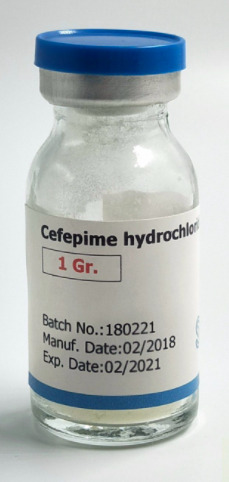
2/
Let's establish a few facts about cefepime:
🔺4th generation cephalosporin antibiotic
🔺Excretion = exclusively in the urine (mostly as unchanged drug)
🔺Readily crosses the blood-brain barrier (so it easily accesses the brain)
https://t.co/rjYG1BfGPR
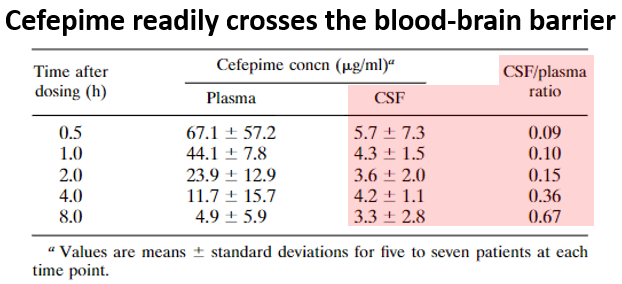
3/
The first report of cefepime neurotoxicity was in 1999.
A patient w/ renal failure received high doses of cefepime and then developed encephalopathy, tremors, myoclonic jerks, and tonic-clonic seizures.
✅All symptoms resolved after hemodialysis.
https://t.co/u7JLVitQpp
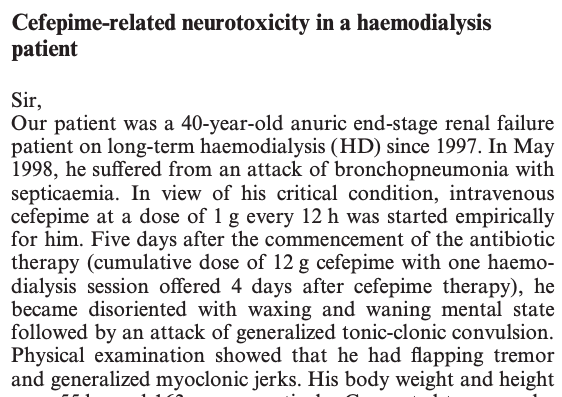
4/
Cefepime neurotoxicity is surprisingly common, occurring in up to 15% of treated critically ill patients (w/ symptoms varying from encephalopathy to seizures).
💡The main risk factors = renal failure and lack of dose adjustment for renal function.
https://t.co/nxbnzSq8AR
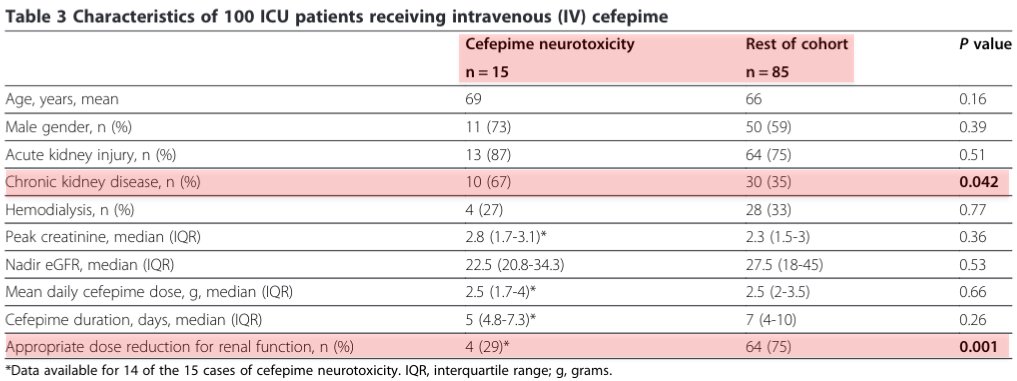
5/
What about cefepime induces neurotoxicity?
One clue is that it's not the only antibiotic that causes neurotoxicity, particularly seizures.
This actually is a class effect w/ other beta-lactam antibiotics (including penicillins and carbapenems).
https://t.co/Lf4BhON9IY
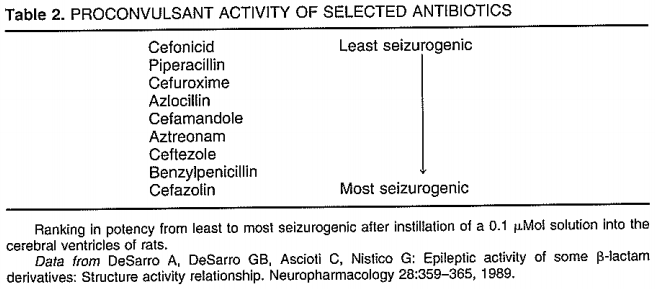
Why can cefepime cause neurological toxicity?
And why is renal failure the main risk factor for this complication?
The answer requires us to learn about cefepime's structure and why it unexpectedly binds to a certain CNS receptor.
#MedTwitter #Tweetorial

2/
Let's establish a few facts about cefepime:
🔺4th generation cephalosporin antibiotic
🔺Excretion = exclusively in the urine (mostly as unchanged drug)
🔺Readily crosses the blood-brain barrier (so it easily accesses the brain)
https://t.co/rjYG1BfGPR

3/
The first report of cefepime neurotoxicity was in 1999.
A patient w/ renal failure received high doses of cefepime and then developed encephalopathy, tremors, myoclonic jerks, and tonic-clonic seizures.
✅All symptoms resolved after hemodialysis.
https://t.co/u7JLVitQpp

4/
Cefepime neurotoxicity is surprisingly common, occurring in up to 15% of treated critically ill patients (w/ symptoms varying from encephalopathy to seizures).
💡The main risk factors = renal failure and lack of dose adjustment for renal function.
https://t.co/nxbnzSq8AR

5/
What about cefepime induces neurotoxicity?
One clue is that it's not the only antibiotic that causes neurotoxicity, particularly seizures.
This actually is a class effect w/ other beta-lactam antibiotics (including penicillins and carbapenems).
https://t.co/Lf4BhON9IY

You May Also Like
1/ Here’s a list of conversational frameworks I’ve picked up that have been helpful.
Please add your own.
2/ The Magic Question: "What would need to be true for you
3/ On evaluating where someone’s head is at regarding a topic they are being wishy-washy about or delaying.
“Gun to the head—what would you decide now?”
“Fast forward 6 months after your sabbatical--how would you decide: what criteria is most important to you?”
4/ Other Q’s re: decisions:
“Putting aside a list of pros/cons, what’s the *one* reason you’re doing this?” “Why is that the most important reason?”
“What’s end-game here?”
“What does success look like in a world where you pick that path?”
5/ When listening, after empathizing, and wanting to help them make their own decisions without imposing your world view:
“What would the best version of yourself do”?
Please add your own.
2/ The Magic Question: "What would need to be true for you
1/\u201cWhat would need to be true for you to\u2026.X\u201d
— Erik Torenberg (@eriktorenberg) December 4, 2018
Why is this the most powerful question you can ask when attempting to reach an agreement with another human being or organization?
A thread, co-written by @deanmbrody: https://t.co/Yo6jHbSit9
3/ On evaluating where someone’s head is at regarding a topic they are being wishy-washy about or delaying.
“Gun to the head—what would you decide now?”
“Fast forward 6 months after your sabbatical--how would you decide: what criteria is most important to you?”
4/ Other Q’s re: decisions:
“Putting aside a list of pros/cons, what’s the *one* reason you’re doing this?” “Why is that the most important reason?”
“What’s end-game here?”
“What does success look like in a world where you pick that path?”
5/ When listening, after empathizing, and wanting to help them make their own decisions without imposing your world view:
“What would the best version of yourself do”?
















